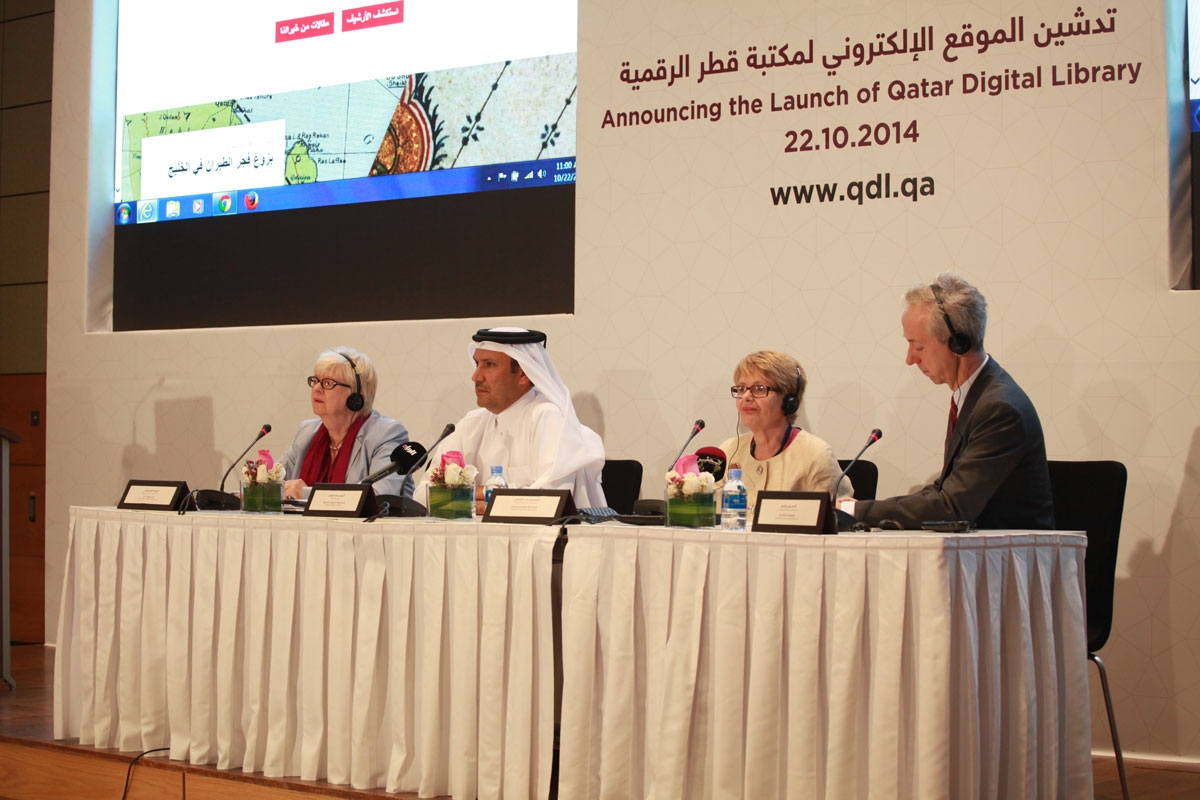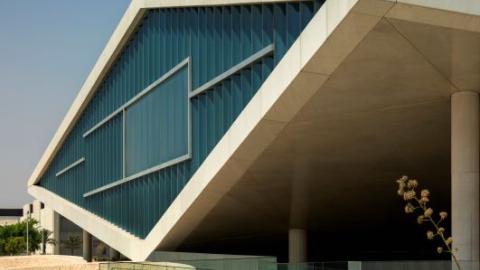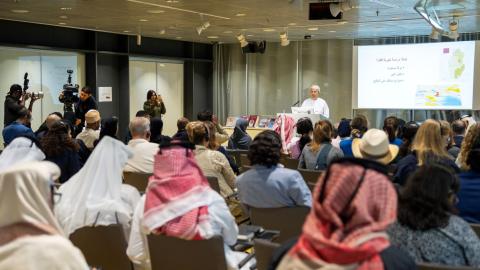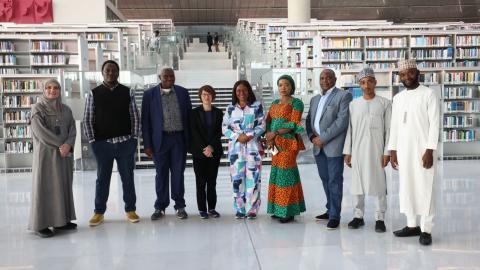
The Qatar Digital Library which provides new public access to over half a million pages of precious historic archive and manuscript material has been launched today thanks to the British Library-Qatar Foundation Partnership project. This incredible resource makes documents and other items relating to the modern history of Qatar, the Gulf region and beyond, fully accessible and free of charge to researchers and the general public through a state-of-the-art online portal.
In line with the principles of the Qatar National Vision 2030, which aims to preserve the nation’s heritage and enhance Arab and Islamic values and identity, the launch of the Qatar Digital Library supports QF’s aim of unlocking human potential for the benefit of Qatar and the world.
Qatar National Library, a member of Qatar Foundation, has a firm commitment to preserving and showcasing Qatar’s heritage and promoting education and community development by sharing knowledge and providing resources to students, researchers, and the wider community.
With Qatar Foundation’s support, an expert, technical team has been preserving and digitising materials from the UK’s India Office Records archives over the past two years in order to be shared publicly on the portal owned and managed by Qatar National Library.
The Qatar Digital Library provides online access to over 475,000 pages from the India Office Records that date from the mid-18th century to 1951, and relate to modern historic events in Qatar, the Gulf and the Middle East region.
In addition, the Qatar Digital Library shares 25,000 pages of medieval Arab Islamic sciences manuscripts, historical maps, photographs and sound recordings.
These precious materials are being made available online for the first time. The Qatar Digital Library provides clear descriptions of the digitised materials in Arabic and English, and can be accessed for personal and research use from anywhere free of charge.
Illuminating centuries of fascinating Arab history and culture and the significant influence of Islamic scholars in the fields of science, medicine, mathematics and geometry, the Qatar Digital Library will play a crucial role in raising awareness and knowledge about the modern history of Qatar and the Gulf region, as well as Arab Islamic heritage.
Highlights of the Qatar Digital Library include a file regarding descriptions and sketches of various flags in the region between 1929 and 1938, including a specimen of fabric demonstrating the colour of the flag flown by the Sheikh of Qatar, Abdullāh bin Jāsim Āl Thāni, who ruled Qatar from 1913 to 1949. The digitised pages also depict other key moments in Qatar’s history including the earliest recorded mention in 1782 of the historic walled coastal town of Al-Zubarah which was the most important trading hub in the region at that time. Elsewhere in the collection, there are records detailing the first survey of Qatar’s coastline which was undertaken in 1823 using modern surveying methods.
Amongst the 25,000 pages of Arab Islamic science manuscripts contributed by Muslim scholars, is an Arabic version of the Data, Kitaab-ul-mu’Tayat, by Euclid, the famous mathematician of Alexandria. The text was translated by Isḥāq ibn Ḥunayn in the 10th century A.D, revised by Thābit ibn Qurrah and is presented on the portal in the edition of Naṣīr al-Dīn al-Ṭūsī.
About the launch, QF President, Engineer Saad Al Muhannadi, said: “The Qatar Digital Library is a valuable resource that unlocks human potential and assists learning and development by promoting a better understanding of heritage. It is a shining example of Qatar Foundation’s dedication to sharing knowledge with people across Qatar, the Gulf region and beyond to benefit all our futures.” He continued: “Qatar Foundation and Qatar National Library are supporting Qatar on its journey from a carbon-based to a knowledge-based economy. In line with the goals of the Qatar National Vision 2030, QF is proud that this partnership with the British Library will benefit learning and research across many different disciplines, and encourage innovation and creativity.”
Dr Claudia Lux, Project Director of Qatar National Library, said: “The Qatar Digital Library embodies QNL’s vision of bridging with knowledge Qatar’s heritage and future. QNL is proud to partner with QF and the British Library, and the outcome of this joint project will inspire future generations by creating one of the world’s most significant and easily accessible resources for studies into Gulf History and Arab Islamic Sciences.” Mr Saadi Al Said, Associate Director of Qatar National Library, said: “The Qatar Digital Library has a wealth of fascinating material that will be of interest to people of all ages in Qatar. From manuscripts of Arab Islamic sciences to new insights into our nation’s history, there really is something for everyone.”

Roly Keating, Chief Executive of the British Library, said: “One of the greatest barriers to furthering research of Arabic cultural heritage and British history in the Gulf has been physical. Previously, you had to go to the British Library to retrieve an archive item. Now, in one click of a button, that barrier has been lifted and global research on the topic will progress with greater urgency than ever before. We now have free and open access to hundreds of thousands of manuscripts, archives, maps, sound recordings and photographs from the region – all digitised in the highest quality. It converts stored knowledge at the Library to shared knowledge, globally.”
To access the Qatar Digital Library, users should visit: www.qdl.qa
In line with the principles of the Qatar National Vision 2030, which aims to preserve the nation’s heritage and enhance Arab and Islamic values and identity, the launch of the Qatar Digital Library supports QF’s aim of unlocking human potential for the benefit of Qatar and the world.
Qatar National Library, a member of Qatar Foundation, has a firm commitment to preserving and showcasing Qatar’s heritage and promoting education and community development by sharing knowledge and providing resources to students, researchers, and the wider community.
With Qatar Foundation’s support, an expert, technical team has been preserving and digitising materials from the UK’s India Office Records archives over the past two years in order to be shared publicly on the portal owned and managed by Qatar National Library.
The Qatar Digital Library provides online access to over 475,000 pages from the India Office Records that date from the mid-18th century to 1951, and relate to modern historic events in Qatar, the Gulf and the Middle East region.
In addition, the Qatar Digital Library shares 25,000 pages of medieval Arab Islamic sciences manuscripts, historical maps, photographs and sound recordings.
These precious materials are being made available online for the first time. The Qatar Digital Library provides clear descriptions of the digitised materials in Arabic and English, and can be accessed for personal and research use from anywhere free of charge.
Illuminating centuries of fascinating Arab history and culture and the significant influence of Islamic scholars in the fields of science, medicine, mathematics and geometry, the Qatar Digital Library will play a crucial role in raising awareness and knowledge about the modern history of Qatar and the Gulf region, as well as Arab Islamic heritage.
Highlights of the Qatar Digital Library include a file regarding descriptions and sketches of various flags in the region between 1929 and 1938, including a specimen of fabric demonstrating the colour of the flag flown by the Sheikh of Qatar, Abdullāh bin Jāsim Āl Thāni, who ruled Qatar from 1913 to 1949. The digitised pages also depict other key moments in Qatar’s history including the earliest recorded mention in 1782 of the historic walled coastal town of Al-Zubarah which was the most important trading hub in the region at that time. Elsewhere in the collection, there are records detailing the first survey of Qatar’s coastline which was undertaken in 1823 using modern surveying methods.
Amongst the 25,000 pages of Arab Islamic science manuscripts contributed by Muslim scholars, is an Arabic version of the Data, Kitaab-ul-mu’Tayat, by Euclid, the famous mathematician of Alexandria. The text was translated by Isḥāq ibn Ḥunayn in the 10th century A.D, revised by Thābit ibn Qurrah and is presented on the portal in the edition of Naṣīr al-Dīn al-Ṭūsī.
About the launch, QF President, Engineer Saad Al Muhannadi, said: “The Qatar Digital Library is a valuable resource that unlocks human potential and assists learning and development by promoting a better understanding of heritage. It is a shining example of Qatar Foundation’s dedication to sharing knowledge with people across Qatar, the Gulf region and beyond to benefit all our futures.” He continued: “Qatar Foundation and Qatar National Library are supporting Qatar on its journey from a carbon-based to a knowledge-based economy. In line with the goals of the Qatar National Vision 2030, QF is proud that this partnership with the British Library will benefit learning and research across many different disciplines, and encourage innovation and creativity.”
Dr Claudia Lux, Project Director of Qatar National Library, said: “The Qatar Digital Library embodies QNL’s vision of bridging with knowledge Qatar’s heritage and future. QNL is proud to partner with QF and the British Library, and the outcome of this joint project will inspire future generations by creating one of the world’s most significant and easily accessible resources for studies into Gulf History and Arab Islamic Sciences.” Mr Saadi Al Said, Associate Director of Qatar National Library, said: “The Qatar Digital Library has a wealth of fascinating material that will be of interest to people of all ages in Qatar. From manuscripts of Arab Islamic sciences to new insights into our nation’s history, there really is something for everyone.”

Roly Keating, Chief Executive of the British Library, said: “One of the greatest barriers to furthering research of Arabic cultural heritage and British history in the Gulf has been physical. Previously, you had to go to the British Library to retrieve an archive item. Now, in one click of a button, that barrier has been lifted and global research on the topic will progress with greater urgency than ever before. We now have free and open access to hundreds of thousands of manuscripts, archives, maps, sound recordings and photographs from the region – all digitised in the highest quality. It converts stored knowledge at the Library to shared knowledge, globally.”
To access the Qatar Digital Library, users should visit: www.qdl.qa



